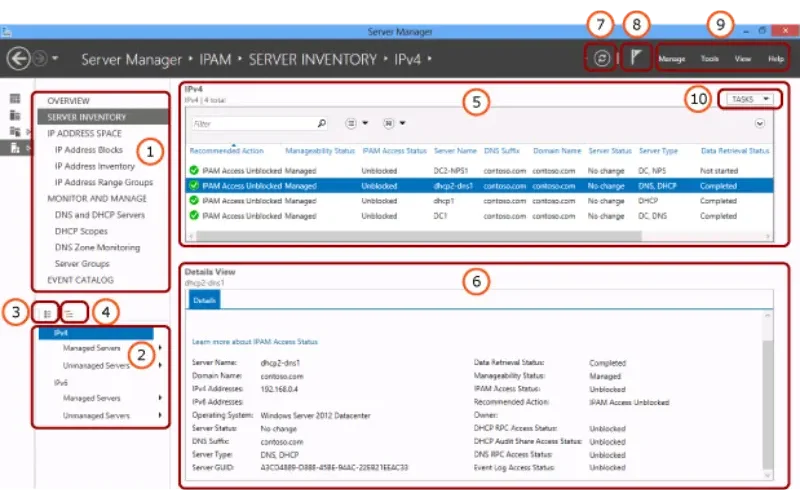- IP address management is a methodology implemented in computer software for planning and managing the assignment and use of IP addresses and closely related resources of a computer network.
- IPAM tools are increasingly important as new IPv6 networks are deployed with large address pools of 128-bit hexadecimal numbers and new subnetting techniques. Famous IPAM tools include SolarWinds IP address manager, BlueCat address manager, Infoblox IPAM and so on.
- IPAM plays a fundamental role in maintaining a reliable, secure, and scalable network infrastructure, supporting business operations and ensuring regulatory compliance.
IP addresses are the fundamental building blocks of network communication, while IPAM is the systematic process and tools used to manage, allocate, track, and utilise these addresses efficiently within a network infrastructure, which ensures that IP addresses are assigned, tracked, and used in a way that optimises network performance, security, and scalability.
Also read: IP address management: The foundation of efficient and secure networks
What is IP address management?
IP address management (IPAM) is a methodology implemented in computer software for planning and managing the assignment and use of IP addresses and closely related resources of a computer network.
Simply put, IPAM is a means of planning, tracking, and managing the Internet Protocol address space used in a network. It refers to the administration of the allocation, tracking, and utilisation of IP addresses within a network, including both IPv4 and IPv6 addresses.
IPAM does not typically provide Domain Name System (DNS) and Dynamic Host Configuration Protocol (DHCP) services but manages information for these components.
Data tracked by an IPAM system may include information such as IP addresses in use, and the associated devices and users. Centralised collection of this information may support troubleshooting and abuse investigations.
Also read: What are IP addresses and why they are important?
Some useful IPAM tools
IP addresses are essential for devices to communicate over the internet or within a private network. IPAM tools are increasingly important as new IPv6 networks are deployed with large address pools of 128-bit hexadecimal numbers and new subnetting techniques.
SolarWinds IP address manager
SolarWinds is a leading provider of IT management software. Their IPAM is a comprehensive solution for managing IP addresses, subnets, DHCP, and DNS services. It offers features such as IP address tracking, subnet discovery, DHCP configuration and monitoring, DNS integration, IP address conflict detection, and reporting on IP address usage. SolarWinds is known for its user-friendly interfaces and robust network management tools.
BlueCat address Manager
BlueCat is a company specialising in DNS, DHCP, and IP address management (DDI) solutions. Their address manager is a centralised IPAM tool that automates IP address allocation, DNS/DHCP configuration, and IPAM data reporting. It supports IPv4 and IPv6 management, integrates with cloud platforms like AWS and Azure, and provides features such as IP address discovery, automated IP allocation policies, DNS record management, and network insight reporting.
Infoblox IPAM
Infoblox is a global leader in secure cloud-managed network services. Their IPAM solution provides centralised management of IP addresses, DHCP, and DNS services. It includes features like IP address discovery, automated IP allocation, DNS record management, DHCP server management, IP address utilisation monitoring, and reporting. Infoblox IPAM is known for its scalability, security features, and integration capabilities with other network infrastructure components.
ManageEngine OpManager IP address manager
ManageEngine is a division of Zoho Corporation, offering a suite of IT management software. OpManager’s IP address manager module provides IP address tracking, subnet management, DHCP server management, and integrated DNS management. It offers real-time monitoring and alerts for IP address conflicts, utilisation, and DHCP lease status. ManageEngine is recognised for its affordable yet feature-rich IT management solutions.
Microsoft Windows server IPAM
Microsoft Windows server includes built-in IPAM functionality for managing IP addresses, DHCP, and DNS services within Windows environments. It offers IP address provisioning, subnet management, IP address utilisation monitoring, and integration with active directory for role-based access control. Windows server IPAM is suitable for organisations using Microsoft infrastructure and seeking a native IPAM solution.

GestioIP
GestioIP is an open-source IP address management tool developed by GestioSoft. It supports IPv4 and IPv6 address management, subnetting, VLAN management, and IP address tracking. GestioIP provides a web-based interface for easy administration, along with features like IP address planning, bulk import/export of IP addresses, IP address utilisation reporting, and integration with LDAP for user authentication.
Men & Mice suite
Men & Mice offers a suite of IPAM solutions designed for hybrid and multi-cloud environments. Their suite includes IP address management, DNS management, DHCP automation, and IP address synchroniation across networks. Men & Mice’s solutions support both IPv4 and IPv6, provide centralised management of IP resources across cloud platforms, offer DNS security features like DNSSEC, and integrate with cloud providers like Amazon’s AWS, Microsoft Azure, and Google Cloud.
Also read: Valeo embraces Google Cloud and AI to drive automotive innovation
Why is IPAM so important?
IPAM plays a fundamental role in maintaining a reliable, secure, and scalable network infrastructure, supporting business operations and ensuring regulatory compliance.
IP addresses are finite resources, especially in the case of IPv4 addresses which are running out globally. IPAM helps organisations allocate and manage IP addresses efficiently, avoiding wastage and ensuring that all devices have unique and necessary addresses.
Proper IPAM prevents IP address conflicts, where multiple devices attempt to use the same IP address. Such conflicts can cause network disruptions, affecting communication and services. IPAM tools track IP address usage and prevent conflicts, contributing to network stability and reliability.
IP addresses are used in network security policies, access control lists, and firewall rules to control traffic flow and protect against unauthorised access or malicious activities. IPAM ensures that IP addresses are accurately assigned and managed, enhancing network security posture.
Many regulatory standards and compliance frameworks, such as PCI DSS (Payment Card Industry Data Security Standard) and GDPR (General Data Protection Regulation), require organisations to maintain accurate records of IP address usage and management. IPAM tools provide the necessary visibility and documentation for compliance purposes.
As networks grow in size and complexity, manual IP address management becomes challenging and prone to errors. IPAM tools automate tasks such as IP allocation, subnet management, and DNS/DHCP configuration, allowing networks to scale efficiently without compromising on management accuracy.
IPAM centralises IP address management tasks, providing a single interface to view and control all IP resources across the network. This centralised approach improves administrative efficiency, reduces the risk of human errors, and facilitates better coordination among IT teams.

